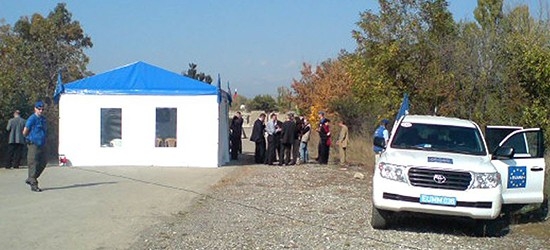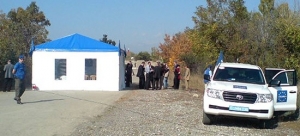Problem of Insecure Movement Raised at 63rd Erneti Meeting
ERGNETI, Eastern Georgia – The 63rd round of the regular Ergneti meetings for Incident Prevention and Response Mechamism (IPRM) has been held in Ergneti today, near the occupation line of Georgia’s breakaway South Ossetia region.
Before the meeting the Georgian side, including representatives from the Office of the State Minister for Reconciliation and Civil Equality and the National Security Service, emphasized that several issues will be raised, referring to incidents that took place since the previous meeting as well as the detention of several Georgian citizens.
The Georgian side has expressed concern over the freedom of movement of local communities, especially during religious holidays, and an increased number of detentions.
Since the previous meeting 10 Georgians have been arrested near the so-called administrative border accused of crossing it illegally, two of them remain in Tskhinvali remand center.
Another Georgian, Gela Iluridze, disappeared near the occupied territory and there has been no trace of him since. The Georgian side will raise this issue at the meeting.
The meeting has traditionally been co-facilitated by the OSCE and the EUMM in Georgia.
This is the 63rd meeting of the IPRM and the EUMM, which is an unarmed civilian monitoring mission established by the European Union on September 15th 2008 to contribute to the stabilization of the situation on the ground following the August 2008 conflict.
The EUMM monitors the full compliance of all sides with the EU brokered Six-point Agreement from the 12th August, signed by both Georgia and Russia, and the agreement on Implementing Measures from 8th September 2008.
The meetings are an opportunity to identify and discuss potential risks and follow-up on incidents and issues affecting the communities on a daily basis.
The Georgian government forces fought two wars against Russian and separatist in South Ossetia 1991-2008.
The wars left hundreds dead and led to the ethnic cleansing of thousands of ethnic Georgians. Moscow recognized South Ossetia and the other occupied Abkhazia region as independent states following the 2008 war.
International law and the United Nations continue to state that the regions remain part of Georgia.
By Tamar Svanidze
Edited by Chloe Diamond












